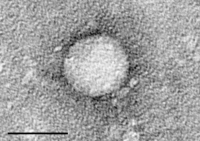
Photo from wikipedia
Hepatocellular carcinoma (HCC) is one of the most common primary liver malignancies and is the third leading cause of tumor-related mortality worldwide. Despite advances in HCC treatment, diagnosis at the… Click to show full abstract
Hepatocellular carcinoma (HCC) is one of the most common primary liver malignancies and is the third leading cause of tumor-related mortality worldwide. Despite advances in HCC treatment, diagnosis at the later stages, and the complex mechanisms relating to the cause and pathogenesis, results in less than 40% of HCC patients being eligible for potential therapy. Prolonged inflammation and resulting immunosuppression are major hallmarks of HCC; however, the mechanisms responsible for these processes have not been clearly elucidated. In this study, we identified SOCS-7, an inhibitor of cytokine signaling, as a novel regulator of immunosuppression in HCC. We found that SOCS-7 mediated E3 ubiquitin ligase activity on a signaling adaptor molecule, Shc1, in Huh-7 cells. Overexpression of SOCS-7 reduced the induction of immunosuppressive factors, TGF-β, Versican, and Arginase-1, and further reduced STAT3 activation. Furthermore, using an in vivo tumor model, we confirmed that SOCS-7 negatively regulates immunosuppression and inhibits tumor growth by targeting Shc1 degradation. Together, our study identified SOCS-7 as a possible therapeutic target to reverse immunosuppression in HCC. The authors demonstrate that the expression of SOCS-7 is decreased in (HCC) cells, as well as in patients, and overexpression of SOCS-7 significantly decreases the proliferation and migration of HCC cells and increases apoptosis in cultured HCC cells. An animal xenogeneic model shows that overexpression of SOCS-7 inhibits tumors, and knockout of SOCS-7 results in tumor growth.
Journal Title: Laboratory Investigation
Year Published: 2022
Link to full text (if available)
Share on Social Media: Sign Up to like & get
recommendations!